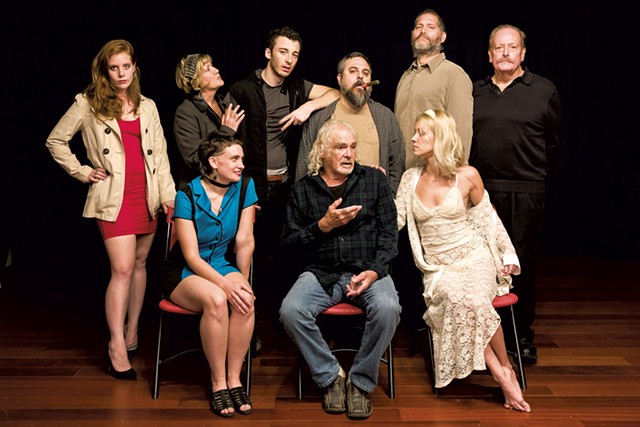
- Oliver Parini
- Standing, left to right: Tobin Jordan, Tracey Girdich, Ellis Burgin, Alex Dostie, Aaron Masi and Dennis McSorleySeated, left to right: Steph-Marie Szenasi, Stephen Goldberg and Nicole Switalska
He's just come from a lakeside bike ride, but Stephen Goldberg still looks the part of the brilliant playwright. Disheveled and distracted as he enters a busy Burlington café, he's clad head to toe in black — well, head to knee, anyway. He wears shorts and sandals, because even brooding geniuses enjoy the rare balmy blast of summer in late October. But sunshine streaking through the café's window does little to lift Goldberg's scattered fog.
He's here to talk about the upcoming revival of his 1996 play Quantum Dog in a Deep Blue Jaguar. Green Candle Theatre Company performs a newly revised version of the one-act play this week and next at Off Center for the Dramatic Arts in Burlington.
When asked about the play, Goldberg seems preoccupied, unfocused. It's almost as if he's never given much thought to the work's themes or origins — though he surely has, having recently reworked it for the upcoming run.
Finally, a question about the role of women in his plays unlocks a favorite thread, one that ties the divergent pieces of Quantum Dog together: victimhood. "Everybody is a victim in my plays," Goldberg states. A wry grin tugs the corner of a white mustache that matches the long, scraggly curls framing his weathered face.
The same could be said of any of the 26 works in Goldberg's decades-deep theatrical canon. But it's particularly relevant to Quantum Dog, which the Burlington playwright and jazz musician, 78, is directing himself.
Quantum Dog is pretty out there, even by the playwright's well-established standards of dark, bizarre edginess. The play revolves around a pair of older friends who are quantum physicists. One has just been released from prison after having been jailed for "coming too close to 'the truth,'" says Goldberg. The other has become an agoraphobe with "a fucked-up family life," he continues. "So that's kind of where it starts from."
Goldberg says he got the idea for the play after a Scientific American article called "Quantum Dog" inspired him to research quantum physics. Audiences will have to unravel how that research led him to include a botched Mafia hit as a key plotline.
In an interview, actor Aaron Masi describes Quantum Dog as "very Goldberg-ian." Masi, who plays agoraphobic physicist Jack, is a veteran of several Goldberg productions as both actor and crew member. His description refers to the play's excess profanity and intensity — two Goldberg hallmarks. "But there are also some things about it that are different," Masi continues. Specifically, the play's strong female characters.
"A lot of the time, the women in his plays are prostitutes or down and out or oppressed," the actor explains. "The women in this play are not that. They're strong and think for themselves."
Those women include Brenda Bradley, played by another Goldberg regular, Tracey Girdich.
"My character goes against the grain of a lot of the women in Goldberg's shows," Girdich says in a phone interview. "She's not exploited. She's not overtly sexual or victimized in any way. So it's interesting to hear Steve's voice take shape in that form."
Goldberg admits that his plays sometimes present women in compromising — or compromised — situations.
"Some of my plays are pretty rough," he says. "I have a play called Sluts on the Roof that I couldn't get anybody to do. It's about women talking about men the way men sometimes talk about women."
"He's Burlington's Bukowski," says Girdich, referring to the late LA writer Charles Bukowski, whom Time magazine once dubbed the "laureate of American lowlife."
Like Bukowski, Goldberg writes with a keen, sometimes-sympathetic eye toward society's losers and outcasts. His gaze is equally unflinching.
"His characters and stories look at darker themes, the underside of life," says Masi. "The philosophy of why people do the things they do fascinates me. And Steve's characters are so complex and well developed."
All that is especially true of Quantum Dog, according to Girdich.
"I like the play because of Steve's poetry and the way he brings these disparate elements together," she says. Quantum Dog is particularly interesting for an actor, Girdich adds, because the key events that shape each character's life don't happen onstage, and in some cases are barely referenced by the dialogue. "That's very different than a lot of Steve's writing," she says.
Those elements will no doubt still be apparent to anyone who saw the original production of the play in New York City, where it debuted in 1996, or the later one at Champlain College. Those viewers may notice differences, too; for the Green Candle production, Goldberg says, he heavily revised the play.
"I must have felt good about it at the time," he says. "But I write a little bit more economically now, more streamlined. It was almost like reading somebody else's play."









Comments
Comments are closed.
From 2014-2020, Seven Days allowed readers to comment on all stories posted on our website. While we've appreciated the suggestions and insights, right now Seven Days is prioritizing our core mission — producing high-quality, responsible local journalism — over moderating online debates between readers.
To criticize, correct or praise our reporting, please send us a letter to the editor or send us a tip. We’ll check it out and report the results.
Online comments may return when we have better tech tools for managing them. Thanks for reading.